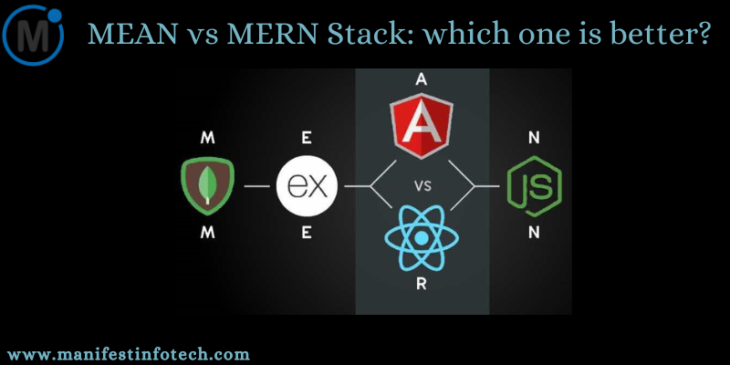
In this blog, we will compare the MEAN stack (MongoDB, Express.js, Angular, Node.js) and the MERN stack (MongoDB, Express.js, React, Node.js) to help you decide which one is better suited for your web development projects.
𝐔𝐧𝐝𝐞𝐫𝐬𝐭𝐚𝐧𝐝𝐢𝐧𝐠 𝐌𝐄𝐀𝐍 𝐚𝐧𝐝 𝐌𝐄𝐑𝐍 𝐒𝐭𝐚𝐜𝐤𝐬:
Before we dive into the comparison, let’s briefly explain what each stack consists of:
𝟏. 𝐌𝐄𝐀𝐍 𝐒𝐭𝐚𝐜𝐤:
– 𝐌𝐨𝐧𝐠𝐨𝐃𝐁: A NoSQL database for storing data.
– 𝐄𝐱𝐩𝐫𝐞𝐬𝐬.𝐣𝐬: A web application framework for Node.js.
– 𝐀𝐧𝐠𝐮𝐥𝐚𝐫: A front-end JavaScript framework.
– 𝐍𝐨𝐝𝐞.𝐣𝐬: A server-side JavaScript runtime.
𝟐. 𝐌𝐄𝐑𝐍 𝐒𝐭𝐚𝐜𝐤:
– 𝐌𝐨𝐧𝐠𝐨𝐃𝐁: Same as in MEAN, a NoSQL database.
– 𝐄𝐱𝐩𝐫𝐞𝐬𝐬.𝐣𝐬: The web application framework.
– 𝐑𝐞𝐚𝐜𝐭: A popular JavaScript library for building user interfaces.
– 𝐍𝐨𝐝𝐞.𝐣𝐬: Same as in MEAN, a server-side JavaScript runtime.
𝐍𝐨𝐰, 𝐥𝐞𝐭’𝐬 𝐜𝐨𝐦𝐩𝐚𝐫𝐞 𝐭𝐡𝐞𝐬𝐞 𝐬𝐭𝐚𝐜𝐤𝐬 𝐛𝐚𝐬𝐞𝐝 𝐨𝐧 𝐯𝐚𝐫𝐢𝐨𝐮𝐬 𝐟𝐚𝐜𝐭𝐨𝐫𝐬:
𝟏. 𝐋𝐞𝐚𝐫𝐧𝐢𝐧𝐠 𝐂𝐮𝐫𝐯𝐞:
𝐌𝐄𝐀𝐍 𝐒𝐭𝐚𝐜𝐤: Angular, a part of MEAN, has a steeper learning curve, especially for beginners. It offers a comprehensive framework for building web applications, which can be both an advantage and a drawback.
𝐌𝐄𝐑𝐍 𝐒𝐭𝐚𝐜𝐤: React, part of MERN, is known for its relatively gentle learning curve. It is component-based and can be gradually introduced into your project, making it easier for developers to get started.
𝟐. 𝐅𝐥𝐞𝐱𝐢𝐛𝐢𝐥𝐢𝐭𝐲 𝐚𝐧𝐝 𝐂𝐮𝐬𝐭𝐨𝐦𝐢𝐳𝐚𝐭𝐢𝐨𝐧:
𝐌𝐄𝐀𝐍 𝐒𝐭𝐚𝐜𝐤: MEAN offers a well-structured and opinionated framework with Angular. While this can be beneficial for maintaining code consistency, it may limit flexibility and customization for certain projects.
𝐌𝐄𝐑𝐍 𝐒𝐭𝐚𝐜𝐤: MERN provides more flexibility, especially with React. You can choose libraries and tools that suit your project’s specific needs, allowing for greater customization.
𝟑. 𝐂𝐨𝐦𝐦𝐮𝐧𝐢𝐭𝐲 𝐚𝐧𝐝 𝐄𝐜𝐨𝐬𝐲𝐬𝐭𝐞𝐦:
𝐌𝐄𝐀𝐍 𝐒𝐭𝐚𝐜𝐤: The MEAN stack has a mature and well-established community with a vast number of resources, libraries, and plugins for all components.
𝐌𝐄𝐑𝐍 𝐒𝐭𝐚𝐜𝐤: MERN has gained significant popularity in recent years, and its community and ecosystem continue to grow rapidly. It offers a wealth of resources and a thriving community.
𝟒. 𝐏𝐞𝐫𝐟𝐨𝐫𝐦𝐚𝐧𝐜𝐞:
𝐌𝐄𝐀𝐍 𝐒𝐭𝐚𝐜𝐤: Angular’s two-way data binding can sometimes affect performance, especially in complex applications. However, it has improved over the years.
𝐌𝐄𝐑𝐍 𝐒𝐭𝐚𝐜𝐤: React’s virtual DOM and efficient rendering make it a strong contender for performance optimization, especially in applications with frequent updates.
𝟓. 𝐒𝐄𝐎-𝐅𝐫𝐢𝐞𝐧𝐝𝐥𝐢𝐧𝐞𝐬𝐬:
𝐌𝐄𝐀𝐍 𝐒𝐭𝐚𝐜𝐤: Angular’s initial versions had SEO challenges due to client-side rendering. However, with Angular Universal, SEO can be effectively addressed.
𝐌𝐄𝐑𝐍 𝐒𝐭𝐚𝐜𝐤: React can also have SEO challenges with client-side rendering. Server-side rendering with tools like Next.js can be used to improve SEO.
𝟔. 𝐏𝐨𝐩𝐮𝐥𝐚𝐫𝐢𝐭𝐲 𝐚𝐧𝐝 𝐈𝐧𝐝𝐮𝐬𝐭𝐫𝐲 𝐀𝐝𝐨𝐩𝐭𝐢𝐨𝐧
Both MEAN and MERN stacks are widely adopted by the industry, and their popularity continues to grow. The choice may also depend on regional or project-specific factors.
If you are looking for any services related to Website Development, App Development, Digital Marketing and SEO, just email us at nchouksey@manifestinfotech.com or Skype id: live:76bad32bff24d30d
𝐅𝐨𝐥𝐥𝐨𝐰 𝐔𝐬:
𝐋𝐢𝐧𝐤𝐞𝐝𝐢𝐧: linkedin.com/company/manifestinfotech
𝐅𝐚𝐜𝐞𝐛𝐨𝐨𝐤: facebook.com/manifestinfotech/
𝐈𝐧𝐬𝐭𝐚𝐠𝐫𝐚𝐦: instagram.com/manifestinfotech/
𝐓𝐰𝐢𝐭𝐭𝐞𝐫: twitter.com/Manifest_info
#MEANvsMERN #WebDevelopment #StackComparison #FrontendDevelopment #BackendDevelopment #Angular #React #NodeJS #JavaScriptFrameworks #TechComparison #DevelopmentStacks #WebDevTools #WebAppDevelopment #TechDebate #DeveloperCommunity #Customization #LearningCurve #PerformanceComparison #FlexibleFrameworks #WebDevelopmentTrends #MERNStack #MEANStack #ReactJS #AngularJS #NodeJSDevelopment #WebTechStack #DevelopmentEcosystem #StackProsandCons #WebDevChoices #TechDecision